Arts & Culture
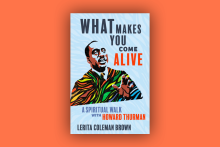
As I began to read Lerita Coleman Brown’s new book, What Makes You Come Alive: A Spiritual Walk with Howard Thurman, I received an overwhelming assurance that there was something to learn in this book about our turbulent and violent times.

TODAY I WANTED to take the time to spotlight a recipe from my forthcoming book, Appetizers to Prepare the Way: Not the Main Course, but Still Pretty Cool.
Now, Honey-Crisped Locusts are delightful to eat year-round (God knows I do!), but they are most satisfying on an early spring day. Just imagine it: You ask some followers friends to meet you by the river. The air is still too cold for a jaunty baptismal dip, but it’s perfect for a picnic. You lay out your camel-hair picnic blanket, which took you two years to knit, and invite your friends to sit down. Then you reach into your (also) camel-hair knapsack, and one of your friends says, “Heck yeah! Did you bring us some bread and wine?” And you say, “Never! I’ve brought something better!” You hand each of them three honey-soaked locusts. Undoubtedly overcome with joy, your friends are at a loss for words, so speechless that they don’t talk to you for the rest of the picnic. The perfect day.

Compulsively larger than life,
mom swaggered out loud.
Her eyes you could get lost in,
and they gripped like a drug.
The Virgin Mary twerking in a thong,
always herself but never the same,
never quite right
but never completely wrong,
she made me feel proud
and destroyed me with shame.
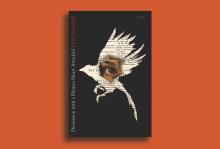
IN EARLY CHRISTIAN gnostic texts, you can read the story of St. Peter’s daughter, who would come to be known as Petronilla. Legend has it that Petronilla was so beautiful that her father prayed she be paralyzed on one side (so that she would not “be beguiled”). In Emily Stoddard’s debut collection of poetry, Divination with a Human Heart Attached, Petronilla is a fruitful companion and the voice of several poems. They appear alongside poems voiced by a contemporary speaker who we assume to be Stoddard herself. In this way, Petronilla serves as a sort of spiritual ancestor for Stoddard. Both look for and lose faith. Both find signs of divine presence everywhere.
While Petronilla’s God speaks in things like “fish and flower,” Stoddard’s confessional work finds God in interior, negative space — not in religious institutions: “I cut away from my body ... slice myself awake to numb arms ... too big to fit inside the church.” She tentatively hopes that “if it’s true, if god is there at all, she kicks us from the inside.” Faith finds form here in ovaries, dreams, the “dark joy” of Stoddard’s dying grandmother finding beauty in “the sunset on the highway.” Unlike Petronilla, whose father fears her seduction by men, the poet-speaker is seduced by poetry — the power of naming things “without the restraint of a scientist.” Names for plants, names for God: “we are not done yet / inventing names / for what will save us.”

“WHERE WILL THE Judaica go?” a friend asks Judith Helfand, in reference to the material objects of her faith. Helfand is an Ashkenazi Jewish documentarian who turns the camera on herself and her family to tell larger stories. Here, she’s telling a story of becoming a “new old mother” the year after her own mother dies. She takes a deep breath of her newborn daughter’s hair and turns to her friend, who is trying to help her store and organize the too many things in her New York apartment. “That is such a good question,” replies Helfand, who embraced motherhood by adopting at age 50. “It’s the age-old Jewish question,” she continues. “Once we left the desert we were like, s---, now we have to find places for our stuff!” She breaks into laughter, that special laugh of the sleep-deprived and overwhelmed new parent, and never answers her friend’s question directly.
Love & Stuff, a POV documentary available on PBS, based on Helfand’s shorter New York Times Op-Doc with the same name, is full of age-old questions about holding on and letting go. Love & Stuff doesn’t offer easy answers or quick fixes, instead revealing the struggles and choices we make in curating our living spaces.

Do We Stay or Do We Go?
Women Talking centers on Mennonite women wrestling with how to respond to serial sexual assault by men from their colony. The film explores the complexity of forgiveness and touchingly reminds viewers that leaving one’s community can be an act of faith.
United Artists Releasing

THE OPENING SCENE of Holy Spider is brutal. We see a woman — a sex worker — leave her child at home to go to work. Walking through Iran’s holy city of Mashhad, she stops at a public restroom to adjust her headscarf and apply bold lipstick. She goes on her first call of the night and does some opium. As she prepares to go home, a man approaches on a motorcycle. He offers her money. She joins him. Shortly after arriving at their destination, he strangles her.
Writer-director Ali Abbasi’s Holy Spider is a fictionalized account of Saeed Hanaei, known as the Spider Killer, who targeted female sex workers in Mashhad from 2000 to 2001. The film, which premiered at the 2022 Cannes Film Festival, examines the killer’s life and the process of capturing him, led by (fictionalized) female journalist Arezoo Rahimi (Zar Amir Ebrahimi).
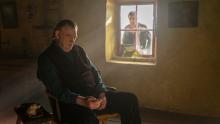
The Banshees of Inisherin has received several awards from the Golden Globes and multiple nominations for the forthcoming Academy Awards. It’s not hard to see why: Martin McDonagh’s film captures the complex, deep turmoil of a friendship falling apart. The friendship falls apart because the characters don’t have the framework to work through misunderstandings due to their depressive state.
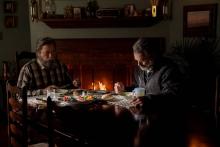
The Last of Us has some of the characters you’d expect in an end-of-the-world series, including Bill, a survivalist portrayed with comical stoicism by Nick Offerman. Only one word can describe the look on Bill’s face when he emerges from his stately New England home, lowers his pistol, and pulls off his gas mask: relief. Not relief that his neighbors were still there, saved from the disaster that government officials had been warning them about, but quite the opposite: Bill’s relief comes from the fact that his neighbors have gone, evacuated to a quarantine zone while he hid in his heavily fortified safe room. With the entire town to himself, Bill indulges in his new life and gets what most doomsday preppers only dream of: an actual doomsday.

Willow has all the themes you’d expect from a fantasy adventure: The party is assembled, there’s a quest, and they go on a rescue mission. The party has a rogue (Amar Chadha-Patel as Boorman), a wizard (Warwick Davis reprising his role as Willow), a bard (Tony Revolori as Graydon ), a paladin knight (Erin Kellyman as Jade), a princess (Ruby Cruz as Kit), and a chosen one (Ellie Bamber as Elora). Notably missing from the 1988 cast is Val Kilmer as Madmartigan (Kilmer is recovering from throat cancer.) The enemies are mainly the Crone, who live in the immemorial city, as well as an unseen quasi-deity that lives below ground — simply titled “the Wyrm.” As with any good fantasy, it’s less concerned about the plot than it is about showing the characters interact, grow, and change, along with a decent amount of throwbacks to the original movie.

The opening words of “doomsday” set the tone for the remainder of McAlpine’s sophomore album, Five Seconds Flat. It is an intense, gut-wrenching journey of love, loss, grief, and the complexities that come with each emotion. McAlpine leans into imagery of death, murder, reckless driving, and other macabre realities to describe this story. Through lyric and melody, she invites us in. I, like millions of others, am here for the ride.

Like the author Miriam Toews, I remember when I heard the news about the “ghost rapes” in Bolivia. I was in seminary training to be a Mennonite pastor. Toews, an ethnic Mennonite who fled her closed community decades before, was living in Toronto. But we shared a visceral and knowing horror as we learned of the events that unfolded in the Bolivian Manitoba Community, events that later inspired Toews’ 2018 novel, Women Talking, and a recent film by the same name.
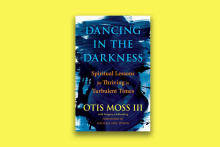
In Dancing in the Darkness, Moss urges readers to move through the sorrow of the blues to what he calls “jazz politics” — one of collaboration, community participation, and dialogue: “If we had a jazz version of democracy in our politics, where each of us could play all our notes, even the blue notes, and contribute them to the music of the whole, then dialogue and honest debate would be the norm rather than demonization and incivility.”

Here’s the setup: A shadowy biotech conglomerate and a cabal of satanists (gasp!) are planning to release Lucifer from hell by… wait for it… stealing the linen cloth used to cover Christ’s body during his entombment, using it to clone Christ’s DNA, and then implanting it into a surrogate mother, allowing Lucifer to possess the fetus. The Devil Conspiracy is like a mix of Rosemary’s Baby, Demon Seed, and the surrogacy mix-up romcom The Switch.

Being unafraid of death is easier said than done. Death is one of the great fears that stalks the minds and hearts of human beings. That being said, there are times when Paul still dares to mock death: “‘Where, O death, is your victory? Where, O death, is your sting?’” (1 Corinthians 15:55). As a pastor, I have held plenty of hands as people die, yet I have never heard such boasting. What I have heard are regrets, contentment, fear, and any number of emotions. How we face death is complicated.

Darren Aronofsky’s latest film The Whale has made a splash, both for Brendan Fraser’s heart-wrenching portrayal of the 600-pound Charlie and for critics’ accusations of fatphobia in the film.

This morning it is minus six degrees.
The old woman at the corner with her bundles
says yes to a ride, but is, at first, unwilling
to say where. Then she does say and tells me
as a girl her grandmother kept three hundred chickens
which she tended every morning before school.
She says a Chinese man would come to separate
the roosters from the hens. Apparently they look alike.
In storybooks there’s no mistaking, but it seems
in real life, one must be outed by his crow.

NEARLY ALL OF us have encountered a person on the street who is unhoused and asking for help. Perhaps we have felt conflicted about how to respond: Should we give them cash? Should we offer to pay for a meal instead? Will the cash we give cause further harm through the purchase of alcohol or drugs? It can be difficult to know how to engage responsibly at the personal or the policy level with the growing problem of homelessness in the U.S.
Enter Kevin Nye’s illuminating book, Grace Can Lead Us Home: A Christian Call to End Homelessness. Nye offers a new lens through which to view homelessness and, more importantly, our neighbors experiencing homelessness. For him, this is not just another justice issue, but rather his calling: He has devoted much of his adult life to working with unhoused people in Los Angeles.
Grace Can Lead Us Home explains the macro-level causes of homelessness and contributing factors. And it reveals micro-level approaches to engaging with our unhoused neighbors in a way that centers our mutual need for connection and belonging. He discusses the lack of affordable housing that drives this crisis; the inadequate mental health support available to unhoused people; and the surprising truth about substance abuse and addiction affecting homeless populations.

“I’m getting into you / Because you got to me in a way words can’t describe.”
WHEN I FIRST heard these lyrics in the early 2000s, I was smitten. I pressed the soft foam of my headphones against my ears to better hear the lyrics of Relient K. My crush, who we’ll call “Jamie,” had chosen this song as track one on the mix CD he burned for me. Near the top of the CD, he sharpied the name of the song: “GETTING INTO YOU” (emphasis Jamie’s).
Surely this was confirmation that Jamie didn’t just like me as a classmate — he was, as Paramore sang it best, into me. But I was naïve; I was mainline; I interpreted Relient K’s lyrics romantically when I should have approached them hermeneutically. Reader, I was so Presbyterian Church (USA) that I had never heard of the PCA. I knew there was an old rugged cross on a hill, but I’d never heard of Hillsong.

Communal Sin
The psychological thriller God’s Creatures follows a mother who chooses to hide her son’s secret, a decision that has damaging ripple effects in her remote fishing village. The film explores how a community’s complacency in covering up sin can systematize and amplify evil.
A24